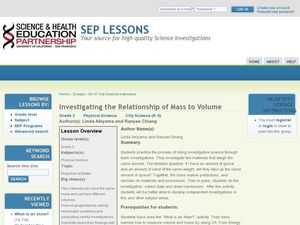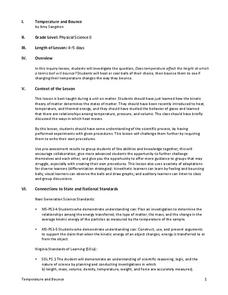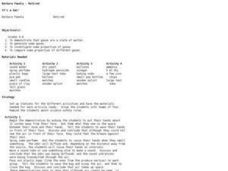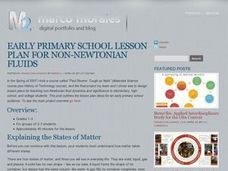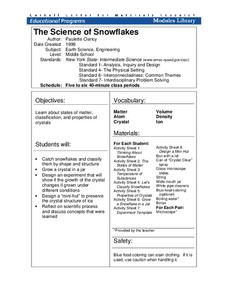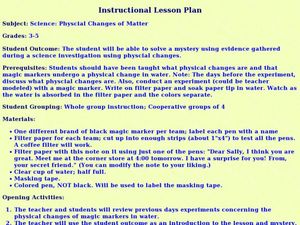Curated OER
Density - An Introduction
Young scholars experiment with objects of different densities. For this density lesson, students examine same-sized objects with different weights, then look at a teacher explanation of density. Young scholars make wave bottles and a...
Curated OER
Investigating the Relationship of Mass to Volume
Third graders explore the relationship of mass to volume. In this physical science instructional activity, 3rd graders participate in an investigation with a several materials and measure the mass and volume using scientific tools....
Curated OER
Chemical Wonders
Students read about and discuss how chemical engineers use different states of matter to create substances. For this chemical engineering lesson plan, students also give examples of the 3 kinds of matter.
Curated OER
The Elements
Fifth graders explore the differences between elements. In this elements and atoms lesson students complete an activity that shows how chemicals react to a flame test.
Virginia Department of Education
Metals, Nonmetals, and Metalloids
How can one easily classify metals, nonmetals, and metalloids? Pupils answer this question as they experiment with unknown substances and perform tests on conductivity, brittleness, and malleability to determine...
STEM for Teachers
Temperature and Bounce
Take part in a fun experiment and hold an impromptu bouncing contest with your class. Young scientists heat and cool balls before bouncing them to determine whether temperature changes affect how they bounce. The set of...
Alabama Learning Exchange
Float or Sink?
Experiment with mass and density as scholars figure out what makes things float or sink. First, they watch a podcast introducing these concepts. Be sure to use the comprehension question to test their understanding. Young scientists...
Curated OER
Force and Motion
Students experiment with force and motion. For this force and motion lesson, students test gravity using a variety of objects. Students rotate through a series of stations which use force, motion, friction, and inclines. Students predict...
Curated OER
Melting, Freezing, and More!: Phase Transitions
Third graders listen to a talk on phase transitions and view three demonstrations. In this phases of matter lesson, 3rd graders complete a worksheet as they listen about phase transitions. They move through three demonstrations of phase...
Curated OER
Starch and Sugar Testing 1
Eighth graders determine the presence of starch and sugar in unknown solutions. This task assesses students' abilities to observe, record and interpret data, classify, generalize/infer, construct data tables, and identify sugar and...
Curated OER
Changing Sugar
In this chemical and physical change worksheet, students use a sugar cube and observe its physical properties both when it is whole and after it is crushed. They heat the sugar cube and record 5 properties of the matter while being...
Curated OER
What's The Matter: A Sinker or Floater?
Students conduct an experiment. In this water lesson, students watch the lesson "Float and Sink" on an interactive website. Students learn how to test items in water and then work in groups to test their items. Students discuss their...
Curated OER
It's a Gas!
Students investigate gases and their properties by completing 4 activities. In this gases lesson plan, students perform activities to show that gases take up space, they diffuse, and that odors and vibrations pass through gases. They...
Curated OER
Gas Laws and Alka-Seltzer Rockets
Students investigate the Ideal Gas Law. In this three states of matter lesson plan, students create Alka-Seltzer rockets using film canisters. Students record observations and data according to the scientific method and explain the gas...
Curated OER
The Scientific Method Using Mystery Powders
Students use the scientific method to determine physical and chemical properties of unknown substances. In this scientific method lesson plan, students discuss chemical and physical properties of substances as a class after a...
Curated OER
Non-Newtonian Fluids
Students will use water, cornstarch, eggs, and more to explore the different states of matter. They will make observations of an unknown substance called "Oobleck" and test its liquid and solid properties. This would be a great lesson to...
Curated OER
Household Chemistry
Students use indicator paper to determine if substances are acidic, basic, or neutral. They test for Ph levels in them. They investigate the effect of oxygen on darkening fruit cut and exposed to the air. They observe vitamin C as an...
Cornell University
The Science of Snowflakes
Who can grow the best crystals? Challenge class members to develop strategies for enhancing growth in the crystals. Through a lab investigation, learners study the properties of crystals and test the effectiveness of different...
Curated OER
Particulate Matter- How Dirty is the Air We Breathe?
Fourth graders investigate air pollution. In this air pollution activity, 4th graders test the air quality by using a block of wood and petroleum jelly. Students investigate the pollutants on the wooden block.
Curated OER
Physical Changes of Matter
Students solve a mystery using evidence gathered during a science investigation. For this physical changes lesson, students analyze a note written in marker to determine the physical changes the ink from the pen underwent....
Curated OER
Particulate Matter: How Dirty is the Air We Breathe?
Fourth graders create a simple testing device and collect and observe the pollution in the air we breathe.
Curated OER
Density and Mass
Learners experiment to find which liquids are more dense. In this density and mass lesson, students predict and then test objects to observe and measure their density. learners observe which items sink and float. Students complete...
Cornell University
Vitamin C Module
Test the levels of vitamin C in different juices. After a lesson on the importance of vitamin C in our diets, learners use titration to determine the vitamin C content in juice. They use their experience with the titration to study the...
Curated OER
Critter? Growth
Students identify and use the elements of the scientific inquiry to solve problems. They explain concepts about the structure and properties of matter. Pupils write an explanation of polymers and how the characteristic of polymers...

